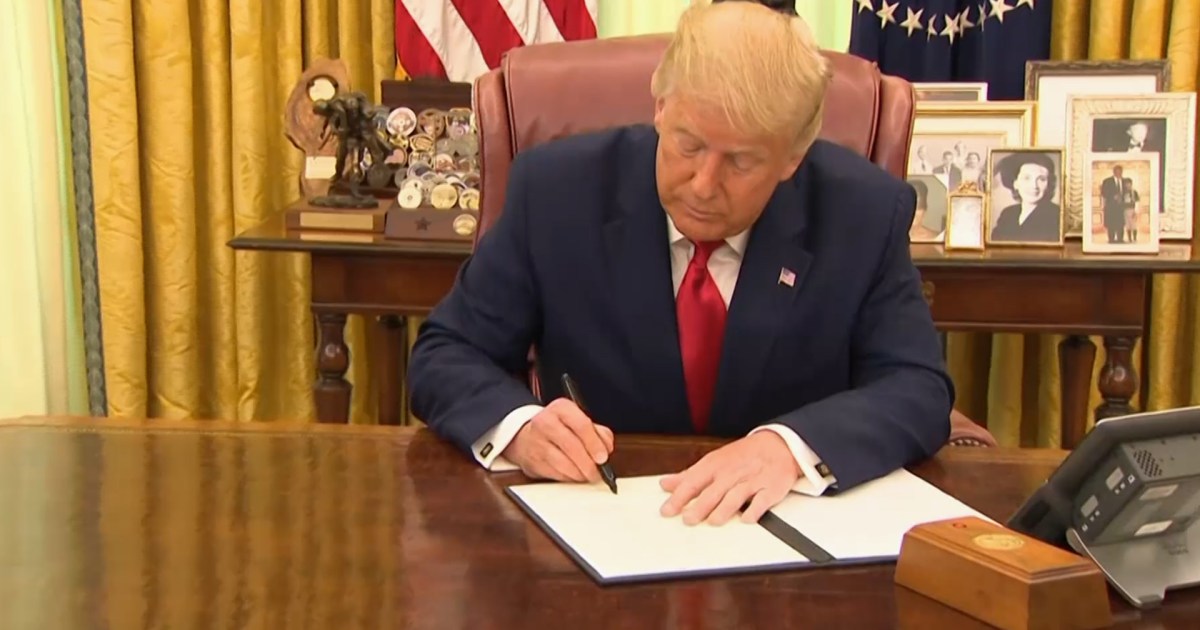The Iranian Foreign Ministry denied the accusation by outgoing US President Donald Trump that Tehran was involved in the missile attacks on his country's embassy in Baghdad.
The Iranian Foreign Ministry said in an official statement, "Washington bears full responsibility for the consequences of any unwise act it takes at the current stage."
She added that the US administration's accusations against Tehran are repeated and unfounded, and accused the White House of fabricating them.
For his part, Iranian Foreign Minister Javad Zarif attacked the US President, and said in a tweet that exposing American citizens to danger outside their country would not distract attention from Trump's disastrous failures at home.
Zarif also posted a picture of Trump's previous tweets, in which he warned of the attempts of former President Barack Obama to provoke a war with Iran at the end of his first term in order to seek re-election.
An American threat
Trump said that "the United States embassy in Baghdad was attacked last Sunday evening by missiles originating from Iran," while the Iranian Foreign Ministry denied this, and said that the accusations of the US administration against Tehran are repeated and unfounded.
Trump wrote on Twitter that he would "hold Iran accountable in the event that any American is killed, and it must think carefully."
Trump attached to his tweet pictures of 3 missiles, which he said did not explode.
Our embassy in Baghdad got hit Sunday by several rockets.
Three rockets failed to launch.
Guess where they were from: IRAN.
Now we hear chatter of additional attacks against Americans in Iraq… pic.twitter.com/0OCL6IFp5M
- Donald J. Trump (@realDonaldTrump) December 23, 2020
Senior White House national security officials have discussed several options to deter Iran and its proxies from attacking US military and diplomats in Iraq.
In turn, the commander of the US Central Command, Kenneth McKinsey, played down the possibility of a conflict between the United States and Iran, expressing his belief that Iran, as well, does not want a war with his country.
However, he warned that there is a great danger that Iran threatens US interests in the Middle East, as the first anniversary of the killing of Qassem Soleimani, commander of the Quds Force in the Iranian Revolutionary Guard, approaches.
McKinsey revealed - in an interview with the "ABC" network - about intelligence information that detected the possibility of an attack inside Iraq, by Iran or groups supported by it.
And US Secretary of State Mike Pompeo accused Tehran of being responsible for the bombing.
The US embassy was attacked on December 20.
The Iraqi army said that at least 8 rockets landed in the heavily fortified Green Zone in the capital, Baghdad.
The Iraqi army said that an "outlaw" group was responsible for the attack, and a US official said that although no Americans were injured in the attack, nearly 21 rockets were fired, several of which hit the building.
The embassy is closed
For its part, the "Axios" news site revealed that the United States intends to close its embassy in Baghdad after a series of missile attacks on the Green Zone by the Iranian-backed armed militias.
The site quoted two informed sources as saying that this step may constitute - among several options on the table - a prelude to retaliation against Iran, which Trump and Pompeo have labeled as a "state sponsor of terrorism."
The website added that the embassy played a pivotal role in supporting a weak Iraqi government.
He revealed that the US ambassador in Baghdad, Matthew Tueller, might be transferred to Erbil (northern Iraq), or Al-Asad Air Base (western Iraq) if he left Baghdad.
Subtractive options
And an informed source said that US national security officials had agreed on several options to deal with Iran.
Reuters quoted a senior US administration official as saying that national security officials had agreed on several options to bring to Trump soon.
The official said the US Secretary of State, Acting Secretary of Defense, National Security Adviser and other senior officials were present during the discussions on Iran.
For his part, Iranian President Hassan Rouhani said that the US economic pressure on his country was the result of an alliance between reactionary countries in the region, Israel and extremists in the United States.
And he stressed in the Iranian government meeting that his country had foiled the comprehensive economic war imposed by Trump on it.
The Iranian president had hinted earlier that his country was ready to cooperate with the US President-elect Joe Biden.
Rouhani said that his country is ready to conduct negotiations with the United States, on the condition that Biden return to the 2015 nuclear deal and lift the sanctions imposed by Trump on Iran.
In 2018, the United States unilaterally withdrew from the nuclear deal, which was aimed at preventing Tehran from obtaining a nuclear arsenal in exchange for providing it with economic benefits.

